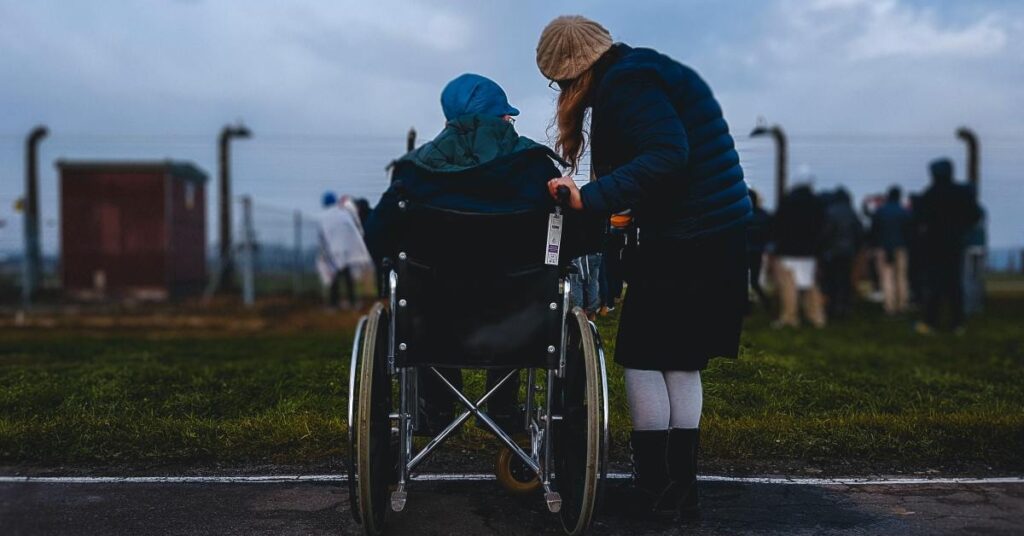
How Long Does it Take to Become a Psychiatric Mental Health Nurse Practitioner?
If you're already a registered nurse, you can become a [...]

If you're passionate about improving older adults' quality of life and well-being, consider pursuing a career as a gerontological social worker. You can enter the field by attaining a bachelor's degree, master's degree, and licensure. This article details the steps you'll need to take to work in this crucial advocacy role.
The aging process can be challenging for older adults. While family members, senior centers, and home health aids can support the elderly if their physical or mental health deteriorates, it’s not always enough to sustain or improve their quality of life. Gerontological social workers can provide holistic support for these loved ones during their golden years.
Equipped with a bachelor’s degree, a Master of Social Work (MSW), credentials, and licensure, you can provide this comprehensive care for the elderly as a gerontological social worker. If you’re passionate about the health and well-being of older adults, this could be the career path for you.
This article details how to become a gerontological social worker including the following topics:
While the steps toward licensure vary at the outset of any social worker’s education and training, gerontological social workers refine their path as they specialize. It’s important to note that even if you start your career in gerontological social work, you don’t have to stay in the same area of specialization forever. Instead, social workers can advance their careers with leadership training to obtain other licenses.
If you’ve decided on gerontological social work as your career path, you can follow these steps for education, credentials, and licensing:
You’ll start your journey by obtaining a bachelor’s degree. While a Bachelor of Social Work (BSW) may be the optimal choice, many other undergrads pivot to social work after graduation. If you acquire your bachelor’s degree in a subject other than social work, you’ll still be eligible to pursue your MSW and social work license.
A BSW, bachelor’s in psychology, or bachelor’s in sociology allows you access to entry-level social service positions throughout your state. These entry-level jobs allow you to gain experience in different specializations to find your calling. These roles also potentially provide superb credentials and references for your master’s program application process.
Enrolling in a Master of Social Work program does not preclude you from continuing to work. Many MSW students opt for flexible part-time or online programs to continue employment as they study. In addition, applicants with a BSW may be able to find programs with advanced standing tracks, while those with other undergraduate degrees will follow traditional standing tracks.
Choosing your MSW program is personal. While geography, cost, and reputation are likely factors, invest in a program that will pay back the highest dividends. Consider not just your potential salary but what else a university offers regarding flexibility, lifestyle, and affordability.
After receiving your MSW, you must become licensed to work in your state. First, you must qualify for boarding requirements, which vary from state to state. You must earn a graduate degree and accrue at least two years of work experience or 3,000 hours of supervised clinical experience. You will then be eligible to take the Association of Social Work Boards (ASWB) Clinical or Advanced Generalist Level exam.
Social workers can acquire multiple levels of licensure, with each state offering different categories.
Social work is an ever-changing field. Stay informed of these changes to provide the best possible patient care. Your state will require you to meet several continuing education requirements to keep your license active. Most states require social workers to complete these credits every two years.
With your MSW, you can apply for a Certified Advanced Practice Social Worker (CAPSW) license immediately. However, in addition to the MSW, you will need many hours of clinical social work experience under the supervision of a board-approved supervisor. Once you complete those hours, you must pass the Association of Social Work Boards (ASWB) Master’s Level exam.
You can contact the Board of Social Work in your state to find out which licensing certificates you qualify for in your career as a gerontological social worker.
| University and Program Name | Learn More |
|
Merrimack College:
Master of Science in Clinical Mental Health Counseling
|
|
|
Virginia Commonwealth University:
Online Master of Social Work
|
As the average life expectancy continues to increase, gerontological social workers are in higher demand. Elderly adults often confront complicated problems and issues that accompany aging. They require the support of trained professionals to sustain a high quality of life.
While geriatric social workers concentrate on medical care and treatment of older persons, gerontology is multidisciplinary. Gerontological social workers study to meet the biopsychosocial needs of the elderly. Their work considers the biological, psychological, and social aspects of caring for such populations. Gerontology provides a more holistic approach to the care of elders.
As a social worker in gerontology, you master connecting aging adults with sources of aid. First, you help older adults and their families by analyzing their situations and addressing their gaps in care. Then, you help them understand how to fill and pay for those gaps.
After an initial examination with an individual, you help them create a care plan, assist them with paperwork, and even offer therapy if they are going through periods of stress, anxiety, or depression. You also assess the operational capacity of your clients, determine whether their aging signs are abnormal, and refer them for medical attention as necessary.
Gerontological social workers also assist older adults in dealing with stress beyond aging. For example, many grandparents must take on the role of a parent for their grandchildren. This transition can be challenging mentally and physically. As a gerontological social worker, you’ll help these grandparents find resources to make their new roles less stressful.
You’ll work in various settings, such as rehab centers, long-term care, government agencies, inpatient and outpatient health centers, and private practices.
The demand for knowledgeable gerontological social workers is increasing. Social workers, in general, have a projected job growth of 9% from 2021 to 2031, according to the Bureau of Labor Statistics (BLS). The BLS projects that the most significant growth will be in areas like gerontological care due to an aging population.
A gerontological social worker’s salary varies depending on experience and location. For example, you can start with a bachelor’s degree at an entry-level job and earn a median wage of about $52,000 per year. But an MSW can quickly pay for itself with increased earning potential.
Glassdoor provides several average social worker salaries you can earn with an MSW based on location. Here are the median annual wages for social workers in a few major U.S. cities:
(Last Updated on February 26, 2024)
Questions or feedback? Email editor@noodle.com

If you're already a registered nurse, you can become a [...]

Social workers holding MSWs will continue to be in demand [...]

A Master of Social Work (MSW) offers a pathway to [...]

You don't need a master's degree to succeed in social [...]
Categorized as: Counseling, Social Work, Social Work & Counseling & Psychology